|
By the time I was properly introduced to the film work of Jackie Chan, he already had a firmly established reputation as the Buster Keaton of martial arts cinema. He was and still is rightly celebrated for his ability to meld inventive physical comedy with stunt work so jaw-dropping that it's no surprise that its execution would sometimes result in serious injury. And having warmly embraced these elements of Chan's easily likeable screen persona, when I first sat down for his 1985 Police Story [Ging chaat goo si] some years back, I was initially a little surprised by what unfolded. Where, I wondered, was the self-depreciating comedy, the dangerous physical stunts and the lightning-fast martial arts I'd come to so appreciate his films for? As the film cross-cuts between a squad room briefing (still a favourite exposition tool in police dramas) and the same squad of detectives preparing to ambush criminal kingpin Chu Tao (Yuen Chor) on the border of a hillside shanty town, the tone is one of po-faced seriousness. When the cops are rumbled, they and Chu Tao's men do battle with guns rather than the expected fists and feet, and when the first big stunt comes it involves cars and shanty town buildings rather than human bodies. That's not to take anything away from a sequence whose scale of destruction is genuinely eye-popping, but for those of us who came with the expectation that Jackie would fight and play the acrobatic fool, this was a little disarming. But as my late mother used to tell me, patience is a virtue, and I didn't have long to wait before the elements that for me defined a Jackie Chan film were being delivered in spades.
It all really starts a short while later when Chu Tao and his crew hijack a double-decker bus and Chan, in his role here as Detective Ka Kui, pursues them by hooking onto the back of it with a snatched umbrella, from which he dangles and skids and dodges oncoming traffic as the vehicle speeds along and hurls around corners while its occupants try to dislodge this unwelcome passenger. When they eventually succeed, Ka Kui continues the chase by tumbling down steep hills, standing firm in the path of the approaching bus and pointing his gun at the terrified driver, who slams on the breaks and sends three of the gang members through the upstairs window.
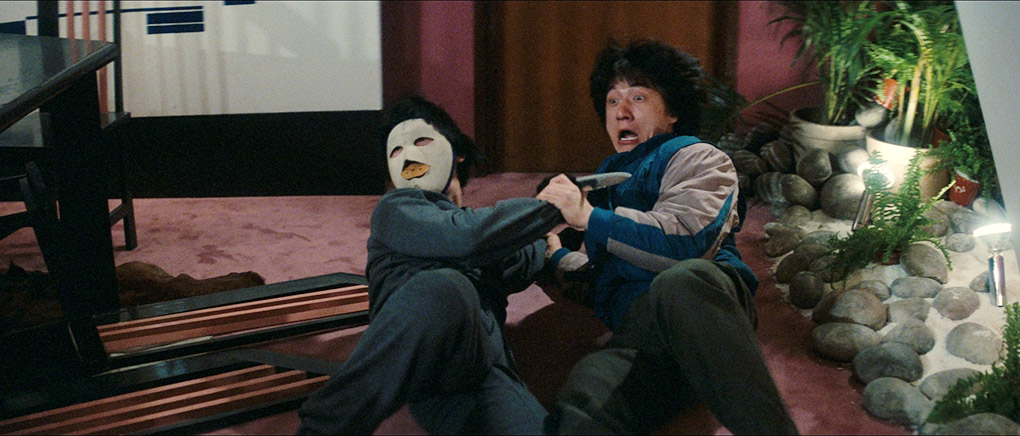
With Chu Tao in custody, the job of protecting his secretary Selina Fong (Brigitte Lin) – a crucial prosecution witness – is assigned to Ka Kui, and it's here that the comedy kicks in. In an attempt to sell himself as a viable protector to a woman he appears to rather like, Ka Kui has his colleague and friend Kam pretend to be a would-be assassin so that he can make a show of defending the defiant Selina and convince her to move in with him until the trial. Having done so, the two are then ambushed by a gang of Chu-Tao's men, and we get the martial-arts battle we've been waiting for, a brilliantly choreographed and performed dance of physical violence in which Chan and his stunt team find a whole string of inventive ways to punch, kick and throw each other around and through the windows of a pair of stationary cars. We're then firmly back in the land of broad comedy when Ka Kui arrives home with Selina, forgetting that it's his birthday and not realising that his girlfriend May (Maggie Cheung) has organised a surprise party for him and that she will be seriously unimpressed when he turns up with this unknown woman.
These sudden shifts of tone and even genre can be a little jarring at times and result in some sequences playing almost as stand-alone sketches. Thus, the film starts off as an action-driven crime thriller, then in the blink of an eye switches to broad comedy and just minutes later becomes a full-blown martial arts actioner. And while there are likely cultural differences at work here, for me some of the comedy is not that great, a collection of hoary old favourites ranging from pie-in-the-face slapstick to a sequence in which Ka Kui makes dismissive comments about May in a boastful attempt to paint himself as a carefree alpha male to Selina without realising that his girlfriend is within earshot. This does, however, lead to what has to be the best sight gag in the film, as Ka Kui attempts to stop May from leaving on her scooter and... no, you have to see this one for yourself. It also serves as a reminder that Chan's real speciality is physical comedy, which is engagingly demonstrated later when Ka Kui is left in charge of a provincial station and ends up juggling four phone calls at once in a sequence whose appeal lies primarily in its deft choreography.
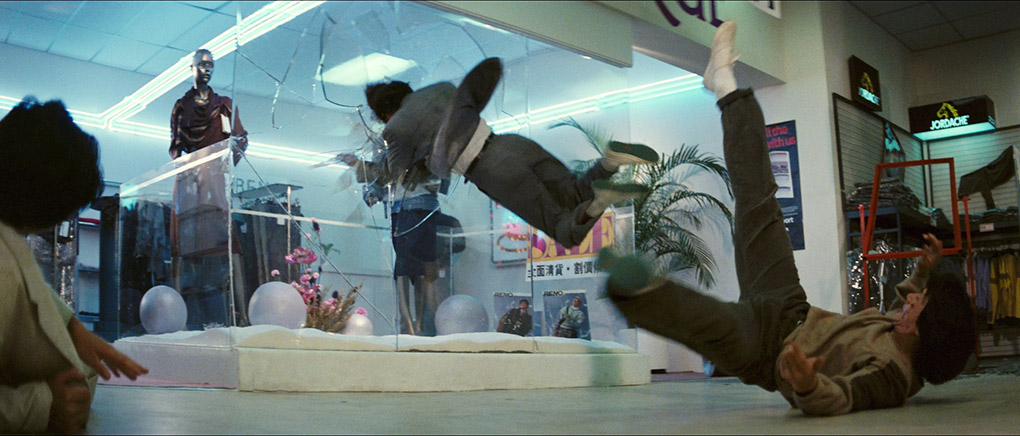
But while some scenes may not dovetail smoothly into the ones that surround them, Police Story still really delivers where it really matters, particularly in action scenes that showcase Chan and his stunt team at their acrobatic and risk-taking best. And it's not in any way hyperbolic to suggest that these people risked life and limb in pursuit of their art. Take the above-mentioned sequence when three of Chu Tao's men are propelled through the upstairs window of a bus. The stunt had been carefully planned so that the stuntmen would land on the roof of a specially prepared car, but a misjudgement instead saw them plummet headfirst onto the tarmac, resulting in injuries that required medical treatment. And that's the take they used in the film. In the early ambush sequence, one man is kicked through a car windscreen and his head clearly makes violent content with the vehicle's bodywork, and members of stunt team are repeatedly spun in the air and land on their chest or back that would shatter the ribs of lesser-prepared men. When Chan is kicked off the bus in the opening chase, meanwhile, the violence with which he hits and rolls along the ground makes me wonder how anyone prepares for such a tumble. And don't get me started on the terrifying leap from the top of an apartment block into a swimming pool far below.
And then there's the climax, an extended fight in a shopping mall that will boggle your mind no matter how many times you see it. Here Chan and his team pull out every available stop and a few more of their own invention, as bodies almost become rag dolls to be tossed and spun and bounced off of objects and thrown through glass cabinets with all the sublimely choreographed elegance of an ultraviolent ballet. This peaks with a visually spectacular pole-slide through a string of exploding lights and a glass ceiling that is shown three times from different angles, an editing trope that would become a genre favourite for showcasing the most show-stopping stunts. Yet despite all of the planning that went into this sequence, no-one predicted that the electric lights surrounding the pole would raise its temperature to such a level that would leave Chan with second-degree burns to his hands, while a bad landing following a leap over a balcony and through a wooden trellis left him badly enough injured to see him rapidly whisked off to hospital.
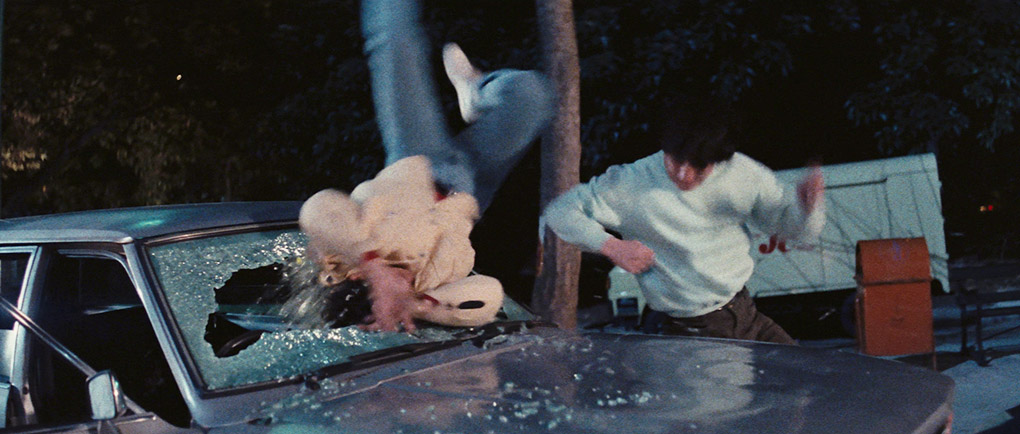
Ultimately, it's these extraordinary action scenes for which Police Story is remembered and so highly regarded, and rightly so. That the film sometimes plays like a series of sketches instead of smoothly running whole ultimately only adds to its charm, and certainly fits with Chan's self-confessed method of building his scripts around pre-planned showpiece action and comedy scenes. Yet as we marvel and the fight choreography and the level of physical punishment Chan and his team seem prepared to take, it's amusing to note that one of the most memorable moments of physical action involves nothing more than Ka Kui leaping over a gate, a seemingly effortless move done with all the grace and fluidity of a seasoned dancer casually executing his most well-practised step.
Police Story 2 begins with less of a bang than its predecessor and some blatant product placement, as the newly demoted Ka Kui chases down and pulls over a fleet of sparkling yellow Mitsubishi trucks that is racing along the highway. In a doubtless deliberate attempt to echo the style of the first film, this is intercut with an earlier exchange at police headquarters in which Ka Kui is receiving a dressing-down from his superiors, Superintendent Li (Lam Kwok-Hung) and Inspector "Uncle Bill" Wong (Bill Tung), for his actions at the climax of the previous film. When Chu Tao secures compassionate release due to a medical report that we assume is fake and may not be after all, he and lawyer make a point of stopping by to taunt Ka Kui while on traffic duty. When Chu Tao's right-hand man John Ko (Charlie Cho) and one of his men rough up May and her mother, however, Ka Kui responds by storming into the diner in which they are cheerily eating and beating seven bells of shit out of them, a brisk battle that ends with a vehicle smashing into the establishment and wrecking it. Given another lecture from Li over his actions, Ka Kui surprises him and Uncle Bill by handing in his notice.
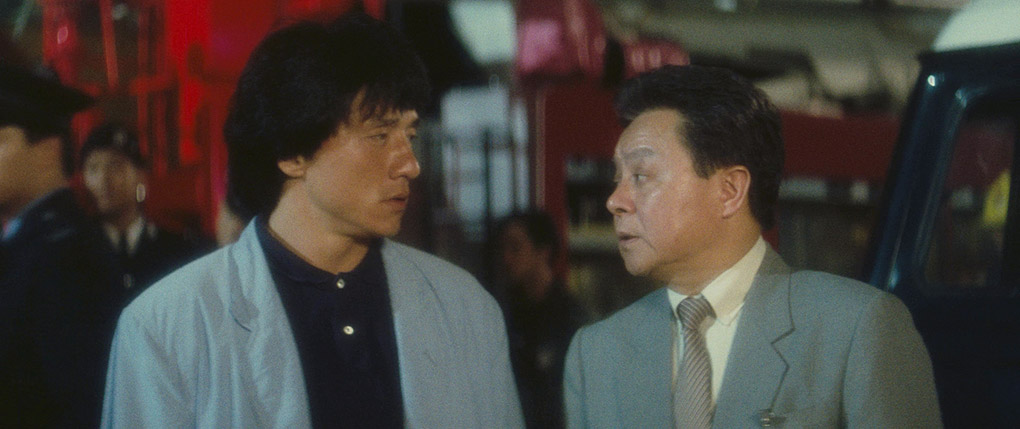
Determined to make things right with the delighted May for the way he's been neglecting her, Ka Kui suggests they go Bali on an extended holiday, which they immediately stop to book at a mall travel agent. They're just on their way out when an old colleague of Ka Kui's reveals that the mall has received a bomb threat. Despite his resignation, Ka Kui instinctively lends a hand and makes the decision to clear the building, an action that is called into question by Superintendent Li until an explosion tears it asunder. It turns out that the bomb was part of a blackmail plot, and after praising his actions in preventing so many deaths, Li and Uncle Bill tempt Ka Kui back into the job to head up the investigation into the crime. That they choose to do so just as Ka Kui is due to depart on his holiday results in the plane taking off without him and drives a new wedge between him and May, which keeps the first film's relationship difficulties firmly on the boil.
Watching Police Story 2 in its full uncut glory, it struck me that the action/story balance has shifted from that of the first film a little in favour of the latter. That's not to say that the story is more complex, just that Chan the director seemed determined here to make a crime thriller in which the action and comedy grows more organically from the surrounding drama rather than playing as stand-alone sequences. And to a degree, he succeeds. Yes, the action set-pieces are still there, but while the film does still intermittently shift tone, there's less of a sense that it's also switching genre on a scene-by-scene basis. The cruder comical elements are still present, ranging from toilet humour and fart jokes at the expense of Uncle Bill's dietary incontinence to a running gag involving Ko's spectacles, which get broken seemingly every time he runs into Ka Kui or May. But intermittently the comedy and drama are rather neatly combined, as when a furious May verbally lets rip into Ka Kui as he backs sheepishly away, and she gets so caught up in her rant that she fails to realise she has pursued her boyfriend into the male changing room and is now flanked by naked men trying to hide their embarrassment. It builds to a final visual pun that works in part because it catches you by surprise, despite being tied to an earlier (and less amusing) running gag.
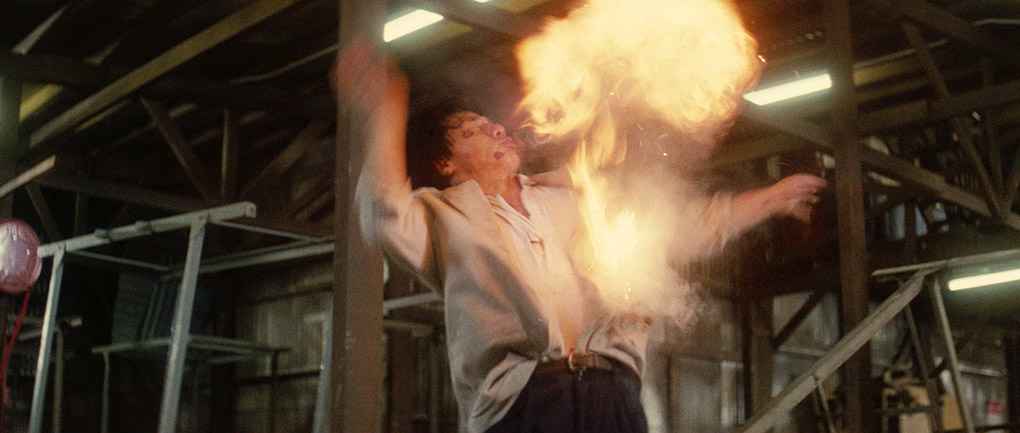
The action, when it comes, delivers all the expected pleasures, with Chan and his team making use of anything that comes to hand to inflict violently acrobatic harm on each other, first in the roadside diner and later in an obstacle-busy warehouse. The best fight of all, however, comes not at the climax but a third of the way in, when Ka Kui chases Ko into children's playground and is ambushed by a sizeable gang of his goons, and the climbing frames become objects for the stunt team to be bounced off and thrown through with the same sort of dizzying energy and dexterity that made the first big fight in Police Story such a joy. Also rather fun and seriously underused is a team of female detectives whose interrogation technique involves charming their suspect before delivering a neatly coordinated arse-kicking. Frankly, they deserve their own movie. And as an unnamed deaf fighter with a fondness for explosive torture, Benny Lai is fast and ferocious enough to provide a convincingly viable challenge to the evenly-matched Chan.
The shift towards drama and the decision to scale up the spectacle with three massive and carefully spaced-apart Hollywood-scale explosions (the climactic one is, as you would expect, the biggest) does make Police Story 2 feel slightly less more like a drama with action scenes than its predecessor, but compensation is provided by improved integration of the comedy into a more developed story and the inclusion of a few non-combat sequences that have their own specific entertainment value. There's nothing to match the extraordinary shopping mall climax of Police Story, but it matters little when the film is still so briskly paced, the lead actor is so likeable, and the action is so well staged. And when the action does come, the sheer mind-boggling physicality of the combat and stunt work leaves the computer-generated action of more recent Hollywood cinema in the dust.
Both films have undergone a new 4K restoration, which are the basis for the 2.35:1 1080p HD transfers on the two Blu-ray discs in this set. Even the best restoration is to a degree at the mercy of its source material, and there are sequences in both films that are either flatly or dimly lit and some of these can look a little dingy, but in all other respects this is easily as good as either film has looked since the first pristine prints arrived at cinemas. The image is sharp and the detail is crisply defined, the colour is attractively rendered when the light levels allow (though a little earthier on some of the interiors, particularly in Police SDtory 2) and the contrast well balanced, though it is a little punchier in some scenes than others. A fine film grain is visible throughout and the picture on both discs is consistently clean with no trace of any former damage and no movement in frame. These are the transfers we've been waiting for.
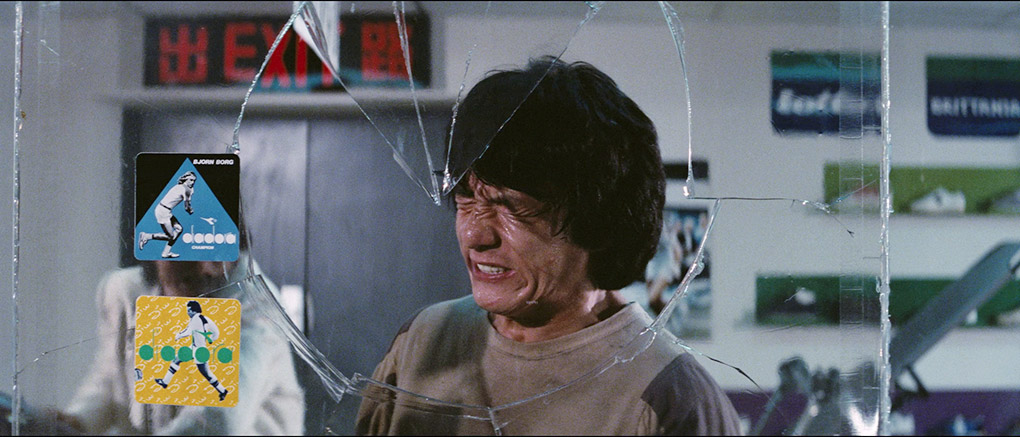
Both films sport the original mono Cantonese soundtracks as Linear PCM 1.0 and they are joined DTS-HD 5.1 surround remixes. The mono tracks show their age and lack the finesse and breadth of the DTS tracks, which really are solid, particularly during the opening scene of Police Story, where gunshots ring so loudly and clearly that I had to close my living room window for fear of alarming the neighbours. Also included is a DTS-HD 5.1 English surround track for both films, which are not quite as lively as the Cantonese DTS tracks and neither of the English dubs is particularly convincing – quite apart from the unconvincing delivery, intermittently words are said when no mouths are moving on screen. Also included on the Police Story 2 disc is an alternative English Linear PCM 1.0 mono track, which is actually rather fun, as the usual cod-American voices have been traded in for rather cultured English ones.
Optional English subtitles are available for both films and kick in by default if the Cantonese tracks are selected.
Disc 1: Police Story
Police Story – Japanese Cut (105:13)
Originally available only on Japanese laserdisc, this slightly longer cut of the first film was transferred to HD in 2012, has burned-in Japanese subtitles on the right-hand side of the picture and has a few small differences and a couple of significant alterations that for me make this the definitive cut of the film.
The first of the big changes comes in the shape of a new opening scene, in which Ka Kui arrives at the police station, having been transferred there after completing his Special Police Force training. He's greeted warmly by Uncle Bill and then introduced to his work colleagues, who are preparing a birthday surprise for Detective Kam, with whom Ka Kui has previously worked. The inclusion of this scene does impact on what follows and even helps to clarify a couple of key points. The knowledge that this is Ka Kui's first day at this station certainly changes how you view all subsequent events and verbal exchanges, as what we are watching now is not Ka Kui the maverick and risk-taking detective, but Ka Kui the new guy, a recent graduate who is busting with enthusiasm and has yet to understand and adapt to his department's way of doing things. The sequence involving Kam is also crucial, as it involves him apprehensively watching out for the birthday cake he expects to be pushed into his face in retaliation for him having done likewise to a colleague earlier that year. This not only establishes from the start that the upcoming drama and action will be laced with comedy, but also provides a reason for Kam showing up at Ka Kui's door on his birthday later and slamming a birthday cake in his face. But there's more. This version also abandons the cross-cutting between the briefing and the subsequent operation to arrest Chu Tao and has the two scenes play out instead in a linear fashion. The result may not be quite as briskly paced but does provide a better build-up to the mission itself, which also benefits from playing out uninterrupted.
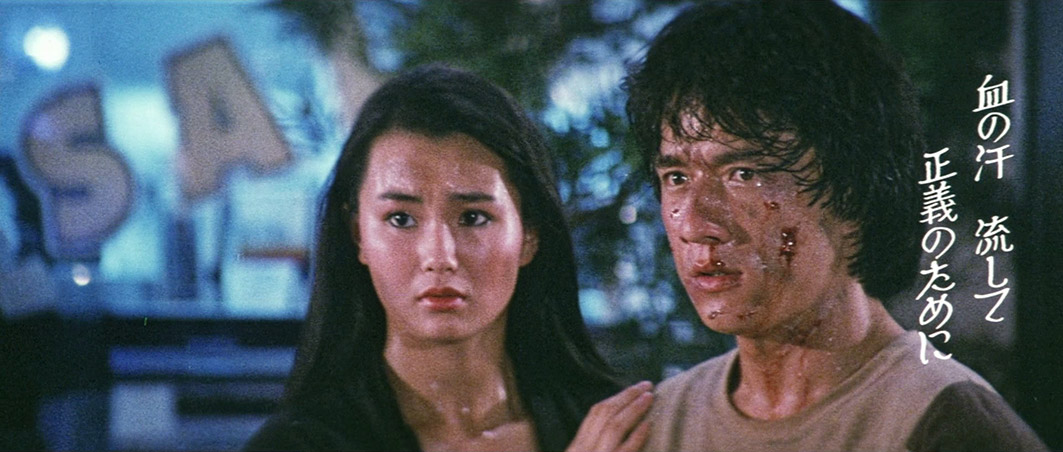
And then there's the ending. The version we all know ends on a freeze frame of the furious Ka Kui being restrained by his colleagues, a nod, perhaps, to the iconic final freeze-frame of Bruce Lee's Fist of Fury (which itself was borrowed from the closing image of Butch Cassidy and the Sundance Kid). Here the scene runs for a good minute longer, as surviving gang members are led out to police vans, Ka Kui and Selina exchange a nicely understated but meaningful look, and Ka Kui is led away by Uncle Bill, presumably to pay for actions that we already know will not be corroborated by Superintendent Li (an exchange that has also been slightly moved in the timeline). The end credits montage of goofs and injuries is also different to the one on the Hong Kong print and includes a quick shot of a triumphant Chan after he successfully pulls off the climactic pole-slide, and Brigitte Lin crossing herself before a stunt in which she is thrown through a glass cabinet.
"Police Force" – US Video Version (98:01)
I've a lot less to say about the US video version, whose principal curiosity value is a replacement electronic (which in the 80s means synthesiser) score Kevin Bassinson and a new English dub, which is more effectively matched to the mouths of the actors than many of its ilk, including the English dub on the Hong Kong version. It still sounds all wrong but isn't offensive. Oh yes, and Ka Kui is called Kevin in this version.
There are five Alternate and Extended Scenes. The Extended Opening (6:56) is the one that appears on the Japanese print and is in better shape on that extra. It's the same story for Press Conference Introduction (0:40) and Extended Ending (3:31), which also includes the end credits and outtakes from that version. Deleted Shots (2:21) is montage of various deleted "snippets" discovered when comparing Hong Kong cut with the extended cut – some are only a few frames long but have been placed in context with the surrounding footage and are highlighted when they appear. Finally, we have Ending Outtakes (Without Credits) (2:57), which is just as the title says, and the removal of the credits does make it easier to appreciate the footage.
Jackie Chan Stunts Promo (4:45)
A music-backed montage of stunts from Jackie Chan movies, including several that went wrong, plus footage of Chan and his team setting up and executing them (this is welcome). It's the sort of material you'll find on the end credits of many of Chan's movies, and is hair-raising stuff if you've never seen it before.
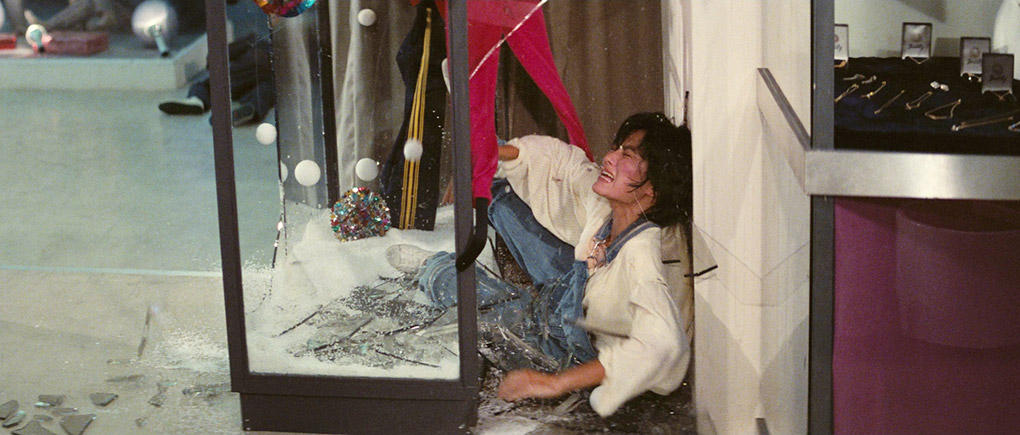
Interview with Jackie Chan (19:34)
Despite some slightly fluffy sound, a useful archive interview with Chan in which he reveals that he builds his scripts around his planned set-piece scenes, still gets scared before doing a stunt, and emphasises the importance of the JC stunt team. He also talks specifically about some of the stunts in the shopping mall climax of Police Story and echoes my own complaint about the over-editing of fight scenes in some lesser (and particularly western) martial arts films.
Original Theatrical Trailer (2:47)
Loads of action cut to the film's theme song, which is sung by Chan himself. You'll hear it a lot on this disc.
4K restoration Trailer (3:13)
Essentially the same trailer, but sharper and with an extra company logo at the front end.
Disc 2: Police Story 2
Police Story 2 – Original Hong Kong Version (106:08)
Transferred from an SD source, this is likely the version of Police Story 2 that I first saw, but I've not watched the film in either version enough times to start listing the differences between them. Essentially, the plot has been condensed and shorn of 15 minutes of footage, but the key attraction here is the inclusion of an optional Commentary Track by critic Miles Wood and stuntman and critic Jude Poyer. Both are based in Hong Kong and so know their way around the local filmmaking process, and provide information on the locations, the actors, the action, the comedic elements (both admit that the fart jokes sit uneasily in the film but claim that they were popular in Hong Kong), Chan's direction and good deal more.
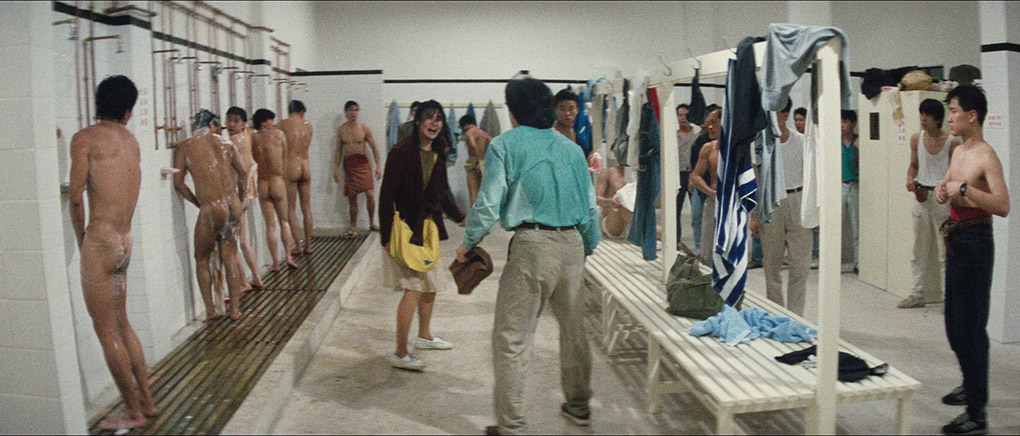
Police Story 2 – Original UK Video Version (95:52)
An alternative cut created for the film's first UK VHS release that loses a horrifying 25 minutes of footage and adds a new English dub track, one so limply unconvincing and flatly performed that it had me alternating between winces and helpless giggles. Of interest, but for heaven's sake don't watch this one first.
Jackie Chan – Son of the Incredibly Strange Film Show (41:08)
Whatever your views on Mr. Jonathan Ross, his 80s series The Incredibly Strange Film Show did a sterling job of highlighting the work of some of our favourite cult filmmakers, and doubtless introduced many to offbeat movies and directors that they were previously unaware of. The second series – titled Son of the Incredibly Strange Film Show and launched in September 1989 – opened with this most engaging look at the cinema of Jackie Chan and is built around interviews with the man himself. And there's some great stuff here, as Chan reveals why he always does his own stunts and claims that no insurance company will cover him or his stunt team, gives Ross a scare by demonstrating the speed he can deliver a triple-punch, and discusses in detail his near-fatal accident when shooting a seemingly straightforward stunt on Armour of God. Ross provides some background on Chan's life and career, with details of his childhood Peking Opera training illustrated with extracts from Painted Faces, a film based on Chan's early life. The programme is also interesting as a time capsule of Chan's expectations for the future, as he shows little interest in working in America again (he was just six years away from shooting Rumble in the Bronx and nine from Rush Hour) and expects to only still be doing his stunt-work for another three or four years. How many has it been now?
Interview with Benny Lai (15:41)
Stunt man Benny Lai, whose actual name is Lai Keung-kun, talks about learning martial arts and working as a stunt man before being chosen by Chan to play the deaf fighter in Police Story 2. He talks about learning to sign and observing the reactions of deaf people in preparation for the role and recalls the moment when he accidentally injured Chan with a firecracker during a torture scene. It's interesting stuff but is severely padded out with extracts from the film – some of which are not relevant to the conversation – and more interesting footage of Lai practising his martial arts.
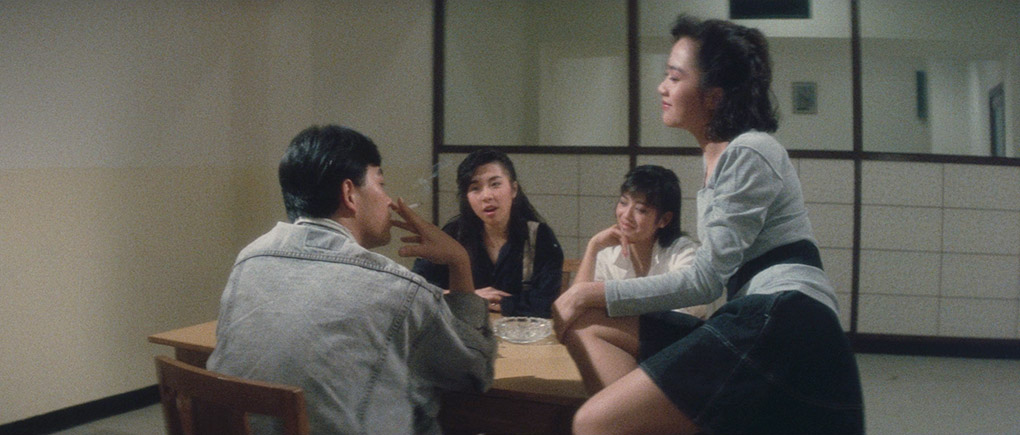
Outtakes (2:06)
The end credits outtakes without the text. Always welcome.
Alternate Outtakes (3:09)
Some of the outtakes from the above are joined by some new ones, a few of them comedic.
Original Theatrical Trailer (4:01)
Seriously, this is a trailer? If so, then it's a bloody peculiar one, as after the opening company logos there's not a word of text, not even the title, which would make it a somewhat ineffective sell. That said, it's a welcome inclusion due to some valuable footage of Chan prepping scenes and rehearsing fight moves with his team.
Alternate Video Trailer (1:54)
An American trailer that actually plays like a trailer, complete with one of those voiceovers ("Jackie Chan is back!") and an explosion of snippets from every action scene in the film.
Also included in the release version is a Collector's Booklet (or possibly one for each film) featuring new writing on the films and rare archival material, but this was not available for review.
Two of Jackie Chan's most beloved movies handsomely restored in HD and packaged with two alternative cuts of each film and a fine collection of worthwhile extras. I particularly applaud the inclusion of the Japanese laserdisc cut and the episode of Son of the Incredibly Strange Film Show, which functions as an excellent introduction to Chan's films to newcomers, should any still exist. The news that Eureka will also be releasing Project A and its sequel in a similar Limited Edition Blu-ray package in October has me twitching with anticipation. Highly recommended.
|